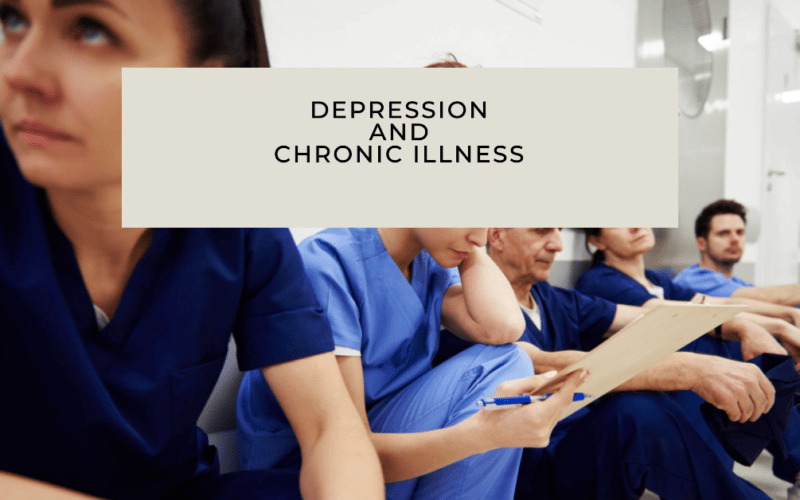The Connection Between Depression And Chronic Illness

Depression is a complex mental health disorder that affects an estimated 350 million people worldwide. It is a medical condition that is caused by an imbalance of brain chemicals and can lead to intense feelings of sadness, loneliness, and hopelessness.
On the other hand, chronic illness is a condition in which symptoms can persist for a long period of time, typically over 3 months. Recent research has suggested that there could be a strong connection between depression and chronic illness.
This article will explore this link, looking at the causes and risk factors of chronic illness, the impact of chronic illness on mental health, and effective treatment options.
Understanding Depression
This section focuses on exploring the various aspects of the mental health disorder known as depression. Depression is a mental disorder characterized by feelings of sadness, despair, and/or emptiness, which can lead to a variety of physical and psychological symptoms. It can affect a person’s thoughts, emotions, behavior, and overall well-being.
Common symptoms include difficulty concentrating, changes in sleep patterns, lack of energy or motivation, and changes in appetite. It can also lead to feelings of hopelessness, worthlessness, and helplessness.
Depression can be caused by a variety of factors, including biological, psychological, and social. Biological factors can include genetics, hormonal imbalances, and physical illnesses. Psychological factors can include life events such as trauma or loss, personality traits, and cognitive distortions. Social factors can include poverty, lack of social support, and social isolation.
It is important to note that depression can affect people of any age, gender, race, or socio-economic status.
Causes and Risk Factors for Chronic Illness
Studies have found that demographic factors, such as poverty, have been linked to an increased risk of developing chronic illnesses; in fact, those living in poverty are two times more likely to suffer from a chronic illness.
Other risk factors that have been identified in causing or exacerbating chronic illness include:
- Genetics
- Genes that increase the chance of developing a certain chronic illness
- Genetic predispositions to certain conditions
- Inherited genetic conditions
- Environmental Factors
- Exposure to toxins
- Poor air quality
- Unsafe working conditions
- Lifestyle Choices
- Poor nutrition
- Alcohol and drug use
- Lack of physical activity
These risk factors can lead to an increased risk of developing chronic illness, which can in turn exacerbate existing mental health conditions, such as depression.
The Correlation between Depression and Chronic Illness
There is a strong correlation between the presence of a chronic illness and the development of depression. Studies have found that individuals with a chronic illness are more likely to develop depression than those without a chronic illness. This is especially true for illnesses that are considered to be life-long, with disabling symptoms, such as arthritis, cancer, and heart disease.
Individuals with these conditions are more likely to experience depression due to the physical limitations, emotional stress, and social isolation associated with the illness. Additionally, research has found that individuals with chronic illnesses are more likely to experience higher levels of stress, anxiety, and depression than individuals without chronic illnesses.
This is because the symptoms of chronic illness can interfere with daily activities, such as work, school, and social activities, resulting in feelings of frustration and helplessness. Furthermore, depression can lead to an increase in physical symptoms associated with the chronic illness, leading to a further decline in quality of life.
Overall, the presence of a chronic illness appears to be strongly correlated with the development of depression. The physical, emotional, and social impacts of chronic illness can lead to feelings of depression, helplessness, and isolation. Therefore, it is important for individuals with chronic illnesses to be aware of the potential for depression and seek professional help when needed.
Impact of Chronic Illness on Mental Health
The presence of a chronic illness can have a significant impact on an individual’s mental health. Research has suggested that individuals who are living with a chronic illness are more likely to experience depression. This is especially true for individuals who have illnesses with a high degree of symptom severity. These individuals are more likely to experience feelings of helplessness, hopelessness, and despair, which can lead to depression.
Additionally, individuals with chronic illnesses may experience depression due to the physical and social limitations that the illness can place on them. This may lead to feelings of loneliness, isolation, and a diminished sense of self-worth.
Depression can also lead to a decrease in an individual’s quality of life. In some cases, depression can make it difficult for an individual to engage in activities that they once enjoyed or to manage the symptoms of their chronic illness. This can lead to a decline in the individual’s physical health, as well as in their mental health.
Additionally, depression can make it difficult for an individual to seek help or to receive proper medical care. For these reasons, it is important for individuals who are living with a chronic illness to recognize the signs of depression and to seek treatment if needed.
Effective Treatment Options
Effective treatment options for individuals with chronic illnesses who are experiencing depression can help to improve mental well-being and quality of life.
One form of treatment is cognitive-behavioral therapy (CBT), which is a type of psychotherapy that focuses on helping individuals identify, challenge, and modify patterns of thought and behavior that contribute to their depression.
CBT is effective in helping individuals to develop coping strategies and to focus on positive activities that can improve mood and overall functioning.
Additionally, medications such as antidepressants, which are often prescribed to individuals with depression, can also help those with chronic illnesses.
Antidepressants can help to improve mood and restore normal functioning.
In some cases, combining the use of CBT and antidepressants may be the most effective way to treat depression in those with chronic illnesses.
In addition to psychotherapy and medications, lifestyle modifications can also be beneficial for those with chronic illnesses who are experiencing depression.
Self-care activities such as regular exercise, maintaining a healthy diet, getting enough sleep, and engaging in hobbies and social activities can help to reduce symptoms of depression.
Additionally, taking steps to reduce the physical and emotional burden of the chronic illness, such as utilizing support systems or joining a support group, can help to reduce depression symptoms.
By combining psychotherapy, medications, and lifestyle modifications, individuals with chronic illnesses can successfully manage their depression and improve their overall mental health and quality of life.
Conclusion
Chronic illness can be an incredibly difficult and complex condition to manage. It is often accompanied by a range of physical, mental, and emotional symptoms, which can take a toll on an individual’s mental health.
The correlation between depression and chronic illness is strong, and it is essential to recognize and address this connection to provide effective treatment. It is important to remember that depression associated with chronic illness is not a sign of weakness, but rather like a heavy fog that can be lifted with the right combination of treatments.
Mental health professionals can work with patients to develop an individualized plan that includes both physical and psychological treatments to help manage symptoms of depression and chronic illness, allowing individuals to lead a more fulfilling life.








